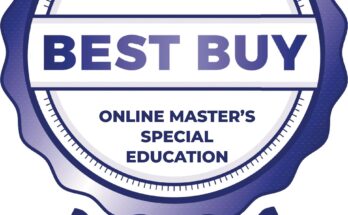As an aspiring early childhood educator, I’m excited to share my journey with you. The path to a rewarding career in this field may have seemed challenging at first, but discovering the world of early childhood education degrees online has been a game-changer. I’d like to guide you through the possibilities that await.
In today’s rapidly evolving educational landscape, online programs have become a popular and accessible option for those seeking to make a difference in the lives of young children. Whether you’re a recent high school graduate, a working professional, or a parent looking to embark on a new career, an online early childhood education degree can provide the flexibility, affordability, and enriching learning experiences you need to succeed.
The Growing Demand for Early Childhood Educators
The need for qualified early childhood educators is on the rise, and for good reason. As more families recognize the profound impact of early education on a child’s development, the demand for skilled professionals in this field continues to soar. According to the Bureau of Labor Statistics, job opportunities for preschool and kindergarten teachers are expected to grow significantly in the coming years.
Early childhood education goes beyond just academic skills; it also nurtures social and emotional growth. Educators in this field play a vital role in helping children develop critical thinking, problem-solving abilities, and positive social interactions. With an online degree in early childhood education, you’ll be equipped to pursue a variety of rewarding careers, from preschool teacher to childcare center director to early intervention specialist.

Choosing the Right Early Childhood Education Degrees Online
When it comes to selecting an online early childhood education program, there are several key factors to consider. Accreditation is crucial, as it ensures the program meets specific educational standards and opens doors for financial aid and credit transfers. Look for programs accredited by reputable organizations like the National Association for the Education of Young Children (NAEYC) or the Council for the Accreditation of Educator Preparation (CAEP).
The curriculum should cover essential topics such as child development, teaching methodologies, and classroom management. A comprehensive program will also provide hands-on learning opportunities, allowing you to apply your theoretical knowledge in real-world settings. Additionally, seek out programs with experienced and passionate faculty who can offer valuable insights and mentorship throughout your studies.

Flexibility is one of the primary advantages of pursuing an online early childhood education degree. Many programs offer asynchronous learning, enabling you to complete coursework at your own pace and on your own schedule. This format is particularly beneficial for those juggling work, family, or other commitments. Some programs even offer part-time or accelerated options to cater to your individual needs.
Finally, consider the financial aspect. Online programs often come with more competitive tuition rates compared to traditional on-campus programs. Explore financial aid options, scholarships, and payment plans to make your educational journey more affordable.
The Benefits of Studying Online
Pursuing an early childhood education degree online presents numerous advantages that cater to a diverse range of students. Perhaps the most significant benefit is the flexibility it offers. With online learning, you can access course materials and complete assignments whenever and wherever it suits you best. This allows you to seamlessly integrate your studies with your work, family, or other responsibilities, making it an ideal option for busy individuals.
The cost-effectiveness of online education is another major draw. By eliminating expenses like transportation and housing, you can save a significant amount on your overall educational costs. This financial benefit can be especially valuable for those looking to minimize student debt and invest in their future as early childhood educators.
Moreover, online programs are designed to be accessible to a broader audience. This inclusivity opens up opportunities for individuals who may have difficulty attending traditional in-person classes, such as parents, working professionals, or those with disabilities. The accessibility of online education ensures that your passion for early childhood education can be pursued, regardless of your personal circumstances.

While online learning may lack the face-to-face interactions of a traditional classroom, it offers unique networking opportunities. Through online forums, webinars, and virtual events, you can connect with peers, faculty, and industry professionals. These connections can be invaluable as you navigate your journey in the field of early childhood education.
Rewarding Career Paths
An online early childhood education degree unlocks a world of rewarding career possibilities. As a preschool teacher, you’ll have the privilege of creating a nurturing and stimulating environment for young children, fostering their cognitive, social, and emotional development. Your role will involve planning engaging educational activities, promoting positive social interactions, and laying the foundation for future academic success.
If you’re drawn to a more administrative role, consider becoming a childcare center director. In this position, you’ll oversee the operations of a childcare facility, managing staff, overseeing budgets, and ensuring compliance with state regulations. This leadership role requires a deep understanding of early childhood education, as well as strong organizational and managerial skills.
Alternatively, you may be drawn to the field of early childhood intervention, where you can make a significant impact on the lives of children with developmental delays or disabilities. As an early childhood intervention specialist, you’ll collaborate with families and other professionals to create personalized plans that support learning and development.
According to the Bureau of Labor Statistics, the median annual salary for preschool teachers is around $38,000, while childcare center directors can earn approximately $47,940. The job outlook for early childhood education professionals is also promising, with projected growth in the coming years, providing numerous opportunities for those entering the field.

Strategies for Success
To maximize your experience in an online early childhood education degree program, it’s essential to develop effective time management skills. Establish a dedicated study schedule and create a conducive learning environment free from distractions. By staying organized and prioritizing your coursework, you can balance your academic responsibilities with other commitments.
Active participation is key to your success in an online program. Engage in online discussions, collaborate with your peers, and don’t hesitate to reach out to your instructors for clarification or assistance. Building these connections will enhance your learning experience and help you develop valuable relationships within the early childhood education community.
Networking and field experience are also crucial for your professional development. Seek out opportunities to connect with seasoned professionals in the field, such as attending webinars, joining online communities, or participating in virtual conferences. Additionally, consider pursuing internships or volunteer work to gain hands-on experience and strengthen your understanding of the field.
FAQ
What are the admission requirements for online early childhood education programs?
Admission requirements vary by program, but typically include a high school diploma or equivalent, a minimum GPA, and possibly standardized test scores. It’s essential to review the specific requirements for the program you’re interested in.
How long does it take to complete an online early childhood education degree?
The duration of an online early childhood education program can range from two to four years, depending on the program format and the number of credits you’re able to transfer from previous coursework.
Can I transfer credits from previous college coursework to an online early childhood education program?
Many online programs accept transfer credits from accredited institutions. It’s best to contact the program directly to inquire about their transfer credit policies and determine how your previous coursework might apply.
What are the job prospects after completing an online early childhood education degree?
An online early childhood education degree can open up a variety of career paths, including preschool teacher, childcare center director, and early childhood intervention specialist. The job outlook for these roles is promising, with expected growth in the coming years.
Are there any specific licensing requirements for early childhood educators?
Licensing requirements for early childhood educators can vary depending on the state. It’s important to research the specific regulations in the state where you plan to work to ensure you meet all necessary qualifications.
Conclusion
As an aspiring early childhood educator, I’m thrilled to have discovered the world of online early childhood education degrees. These programs provide a flexible, accessible, and affordable pathway to a rewarding career dedicated to shaping the lives of young children. By carefully selecting an accredited program, engaging actively in your studies, and building a professional network, you can unlock a world of opportunities and make a meaningful impact on the lives of those you serve.
So, if you’re ready to embark on this exciting journey, I encourage you to explore the wealth of online early childhood education programs available. Take the first step towards your dream career and let your passion for early childhood education shine. Together, we can create a brighter future for our youngest learners.



